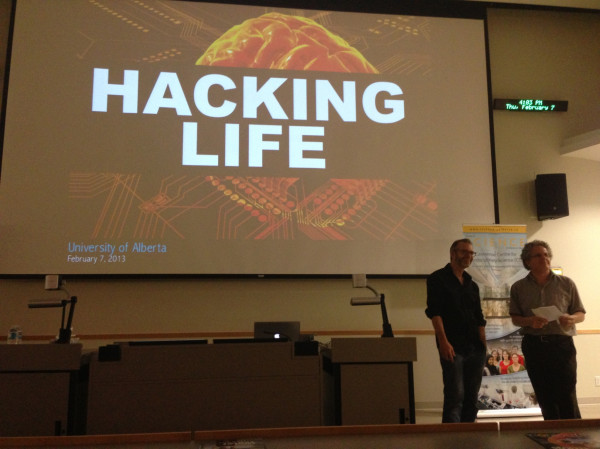Andrew Hessel visited the University of Alberta to give a talk about synthetic biology, entitled “Hacking Life”. I live tweeted the references he put up on slides using the hashtag #hackinglife, and I’ve complied the list and some of my notes. I don’t presume to summarize his whole talk, but most of the relevant links are here.
Hessel’s works for AutoDesk with the title of Distinguished Researcher, and one of the first things he discussed was an AutoDesk initiative known as the Bio/Nano/Programmable Matter group. The group’s aim is to identify the implications that nanotech and programmable matter have on industries that use AutoDesk tools.
Hessel was also one of the co-chairs of Bioinformatics and Biotechnology for Singularity University, what he refers to as the first start-up university. SingularityU is one of the few institutions that teaches concepts of accelerating technological growth as one of their core concepts.
To tie the idea of synthetic biology into everyday life, Andrew mentioned the use of 3D printers in emerging co-operative “hacker-spaces”, and one such 3D printer he featured was the MakerBot. While the MakerBot doesn’t yet print using the cells that Hessel described, there are a a number of groups, like BioCurious who presume to do just that.
Some of the artwork that Hessel used in his presentation comes from Dr. Goodsell’s book, The Machinery of Life, and from his website.
Hessel’s own career was changed when he left his PhD to go and work on synthetic hormones, like the red blood cell growth stimulating protein, Erythropoeitin.
Many of the companies that Hessel mentioned in his talk were biotech firms, both large and small, that are making leaps and bounds in lowering the cost of generating custom gene and protein sequences. The world’s largest gene sequencing shop, BGI Genomics was compared to smaller startups like DNA20 and Cambrian Genomics.
Hessel’s main push was that there are enormous opportunities for small biotech firms to grow and thrive on new technology, especially in applications like personalized medicine. To that end, he used examples like Craig Venter’s synthetic bacterium, Eckhard Wimmer‘s synthetic poliovirus to show how companies like GingkoBioWorks and SyntheticYeast are creating markets for synthetic biological applications.
In his concluding remarks, Hessel shows us some concrete examples of how new biotechnology is changing our lives: modified HIV-viruses being used to treat leukemia and the possibility that these new technologies could be abused in the form of personalized bio-weapons. One of his intiatives resulted in the iGEM Synthetic Biology competition, which now has High School, Collegiate and Entrepreneurship divisions.
He left the audience with a solid lesson, “You are the most empowered generation of individuals. Don’t squander it.”
